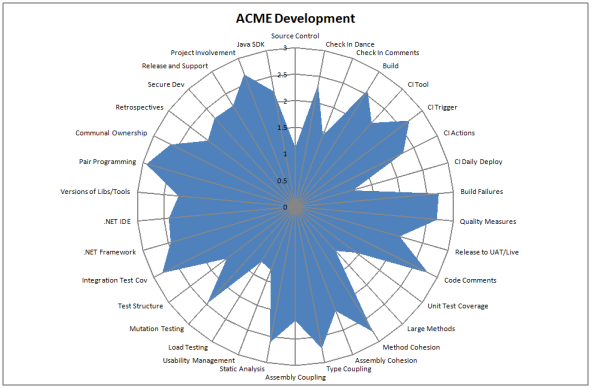Quality Radar
Now I’m back on the blogwagon, I though I’d let you know about one of the things I’ve been doing over the last couple of months.
As useful as standards and guidelines are they are very much based in the here and now. What is missing is a statement of the goals for your development practices over the next year or two. Where do you and your organisation want to be over this time frame? To that end I created a mulitple choice survey with each question having 4 answers. The questions used the following scoring system
- 0 = The practice, tool or what-not mentioned in the question is not used / followed
- 1 = It is used / followed, but in an obsolete manner
- 2 = It is used / followed according to current standards
- 3 = It is used / followed according to our future goals
The questions fitted into five broad categories
- Configuration Management
- Tools
- Practices
- Code Quality
- Testing
If you take the averages across all of your development teams you can chart it like so:
At a glance you can tell whether standards are being meet, software quality aspirations are being achieved or that certain aspects of your development practices are below par. The more of the circle that is filled, the better you are at acheiving your goals. When you get scores mainly falling between two and three it is time to raise the bar.
This information is useful in a couple of ways. If you plot the scores in ascending order you can tell what thinds need to improve and spend your effort on them, based on their priority. You can group this info into categories to ascertain if you have any problem categories.
You can also plot individual teams against the average. This enables you to hightlight to all devs what a particular team is good at. It also lets teams know where to get help from other teams who have a higher score for that particular practice.
If you re-run every quarter or so, you can evaluate how the organisation has changed, identifying what worked and what didn’t. It’s basically a retrospective at a higher organisational level.
Design Patterns Study Group
We’ve been running a weekly lunchtime session for interested developers on design patterns. I suggest that you do the same, as we have found it very valuable in coming to a common understanding of what each pattern is about, when you might use it and real world examples in our current code.
Somebody made the point today that we seem to have the most debate about what we perceive to be the mostly widely used and understood [particularly creational] patterns. This for me highlights the importance of running these sessions. We use something like the approach outlined here, but announce which pattern/s we will be looking at next week based on what is related / of interest / controversial.
Software Craftsmanship
I’m helping to organise the Software Craftmanship 2009 conference to be held at the BBC Worldwide offices in West London on the 26th Feb 2009.
I’m a member of the selection panel and requests for proposals are now open. If you would like to do an interactive session with a bunch of passionate developers may I suggest that you propose a session as soon as you can. Jason has done a great job in assembling the selection panel which contains many leading lights in the world of software.
Registration for the conference opens on the 1st December.
I knew this would happen
I fully expected myself to get out of the habit of blogging at least once a week. I’ve been on holiday [twice] and it only takes a few weeks away from the world of software development to let something slip.
Anyway, I’m back. Honest.
